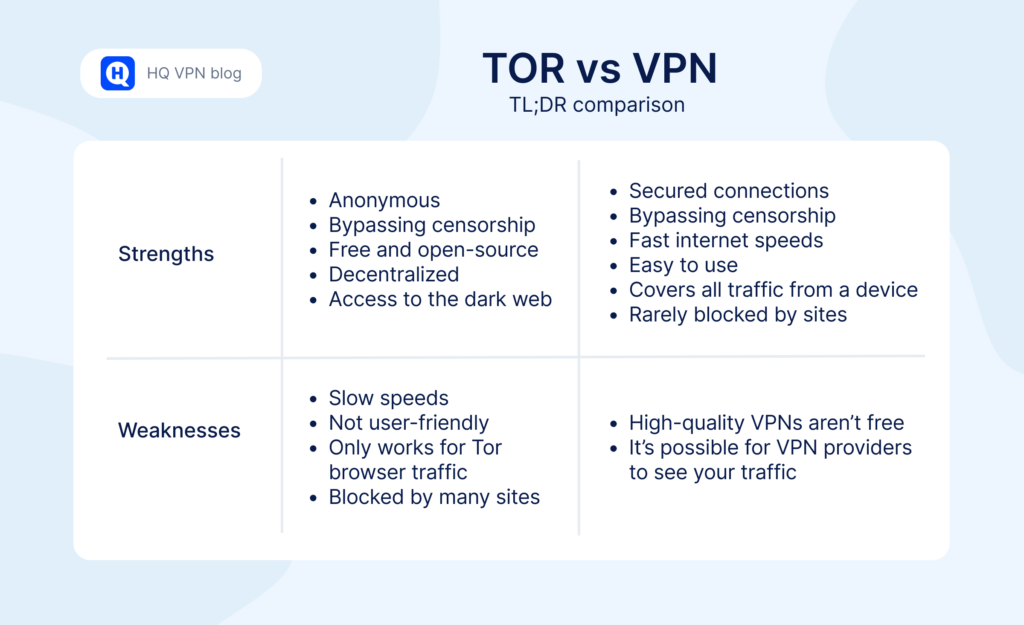

Tor vs VPN: Choosing Your Ultimate Shield

You can’t talk about online security without mentioning two key players: Tor and VPNs. They’re like the Batman and Superman of the digital world, each with its set of unique features.
In this face-off between Tor vs VPN, we’ll break down their distinctions, advantages, and drawbacks. Get ready to learn more about these digital protectors, as we delve into the essentials of cyber anonymity.
TL;DR: Tor vs VPN

What is Tor?
Tor, short for “The Onion Router” stands out as free, open-source software designed for anonymous internet browsing, even delving into the depths of the dark web. It achieves this by cleverly steering your online traffic through a network of volunteer-operated servers, making it a tough nut to crack for anyone trying to trace your actual IP address.
However, there’s a trade-off; Tor can be a bit sluggish and inconsistent, making it not the best choice for for activities like streaming or gaming.
How does Tor work?
Tor anonymizes internet traffic by encrypting and routing it through a series of volunteer-operated servers worldwide. This layered approach, known as Onion Routing, prevents any single server from knowing both the source and destination of the data. With anonymous entry and exit points, Tor enhances online privacy, but it may introduce some latency. Users should also employ end-to-end encryption for secure communication.
Is Tor legal?
Shortly, yes. Tor is legal.
Using Tor to browse the internet and enhance your online privacy is within the bounds of the law. It’s a tool designed to provide anonymity, and many individuals, including journalists and activists, use it to safeguard their digital identity.
However, like any technology, Tor can be misused by individuals engaging in illegal activities. The key lies in how you use it. As long as you’re on the right side of the law, exploring the depths of the internet with Tor is well within your digital rights.
Is Tor safe?
The next obvious question that emerges is whether Tor is safe. In a nutshell, yes, Tor is designed with security in mind. It encrypts your data and bounces it through a series of servers, making it significantly harder for anyone to trace your online activities. It’s a robust tool used by individuals seeking privacy in countries with restricted internet access or by those navigating the digital world with heightened security concerns.
However, it’s crucial to be aware of potential risks such as:
Exit node risks. The last stop in the Tor network is the exit node. Despite encryption within Tor, data is decrypted at the exit node. If operated by someone with malicious intent, they might intercept your unencrypted traffic. Using websites with HTTPS is key, adding an extra layer of security.
Malware. Tor is often used to explore the dark web, where onion sites can harbor sketchy content with potential malicious links. Clicking on links or downloading files from untrustworthy onion sites can pose serious risks.
Phishing. Cybercriminals frequently use phishing to steal personal information. Since activities on Onion sites are untraceable, criminals might attempt to phish your data. Stay vigilant and only provide personal information on trusted websites.
Traffic identifiability. High Tor usage could make you stand out among users, potentially compromising anonymity. While Tor aims to provide anonymity, patterns in traffic might be used to de-anonymize users. Stay mindful of your online footprint to maintain the effectiveness of Tor’s protective features.
Like any technology, its safety depends on how you use it. While Tor provides a shield of anonymity, users should be mindful of best practices, such as using secure and encrypted connections, to ensure a safer online experience.
What’s the difference between Tor and VPN?
Now, let’s unravel the distinctions between Tor and VPN.
Tor: The Anonymous Relay
Tor, or The Onion Router, is like a ninja for your internet connection. It bounces your data through a series of volunteer-operated servers, making it harder for anyone to trace your online steps. It’s the go-to choice for those who prioritize anonymity, especially when diving into the depths of the dark web. However, the downside is that Tor can be a bit sluggish, like trying to sprint in a ninja suit – effective, but not the fastest.
VPN: The Virtual Privacy Bodyguard
On the other hand, a VPN is like a reliable bodyguard for your online activities. It creates a secure tunnel between your device and the internet, encrypting your data and shielding it from prying eyes. VPNs are the champions for security, providing a fast and versatile shield for various online tasks. Need to stream your favorite show from abroad? A VPN is your ticket.
The Main Difference: Anonymity vs. Security
So, Tor is all about anonymity, making it tough for others to know who you are and what you’re up to. It’s your digital invisibility cloak. On the flip side, a VPN prioritizes security, ensuring your data is safely encrypted as it travels through the internet. It’s like having a secure tunnel for your online adventures.
In a nutshell, if you want to be the internet equivalent of a shadow, Tor’s your pick. If you want a trustworthy companion that ensures your data stays private and secure, a VPN is the way to go. It’s like choosing between being a digital ninja or having a virtual bodyguard – both formidable options, just serving different purposes in the vast landscape of online privacy.
Wrapping Up
So, there you have it – the Tor vs VPN face-off. The choice ultimately boils down to your unique needs and priorities.
If you’re all about a seamless, secure browsing experience, a VPN is your tech-savvy best friend. It’s like the James Bond of online privacy – available, sophisticated, and efficient. With advanced encryption protocols, it shields your online activities without putting your internet speed on a diet. Just be sure to choose a reputable VPN service like our trusty companion, HQ VPN.
On the other hand, if disappearing into the digital shadows is your goal, even if it means sacrificing some speed, Tor is your ally as it provides unparalleled anonymity. For an extra layer of defense, consider pairing Tor with a VPN to ensure you’re covered from all angles.
In the end, it’s not a battle of good versus evil but a matter of personal preference. Whether you opt for the sleek efficiency of a VPN or the elusive anonymity of Tor (or both), the key is understanding what suits your online habits best.



